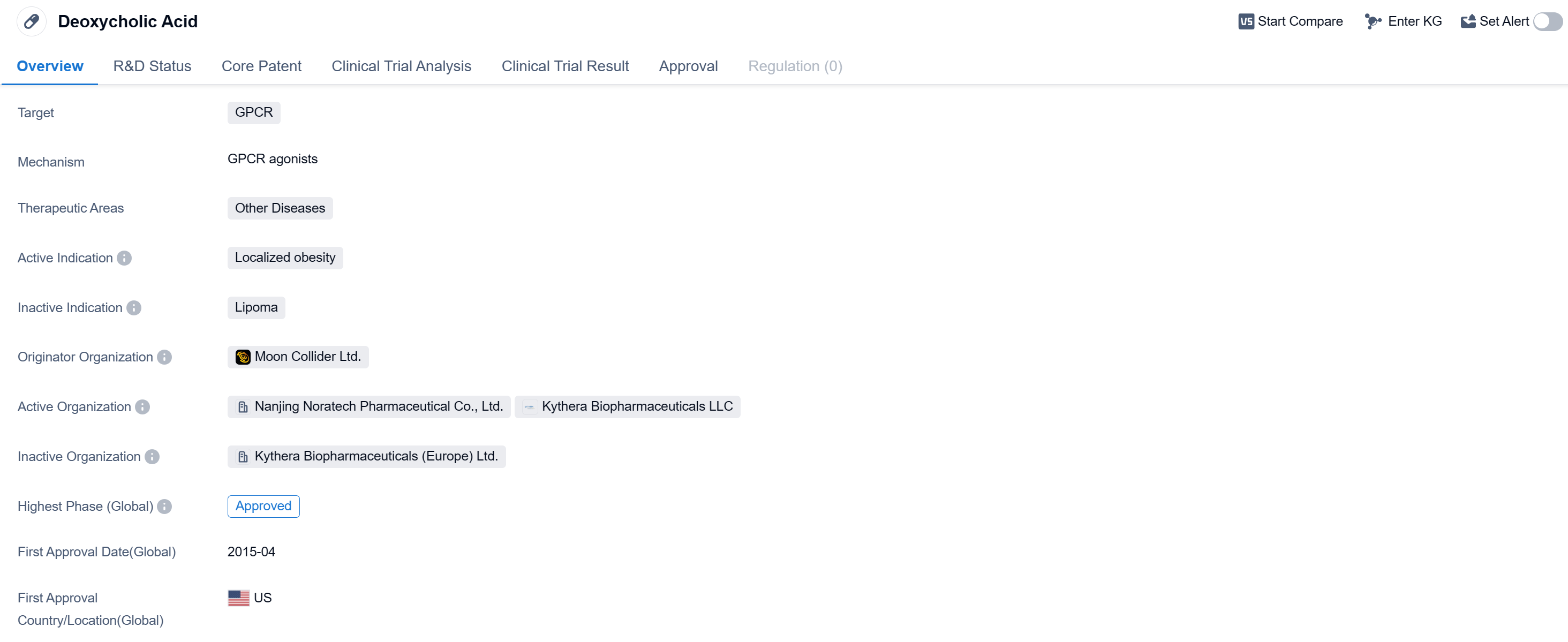Deoxycholic acid: Detailed Review of its Transformative R&D Success, Mechanism of Action, and Drug Target
Deoxycholic acid's R&D Progress
Deoxycholic Acid is a small molecule drug that targets GPCR (G-protein coupled receptor). It falls under the therapeutic area of Other Diseases and is primarily indicated for the treatment of localized obesity. The drug was developed by Moon Collider Ltd., an originator organization in the pharmaceutical industry.
Deoxycholic Acid has undergone clinical trials and has reached the highest phase of approval globally. It was first approved in the United States in April 2015, making it available for use in that country. However, it is important to note that the information does not specify the regulatory status of the drug in other countries.
The drug's highest phase in China is Phase 3, indicating that it is still undergoing clinical trials in that country. This suggests that Moon Collider Ltd. is actively pursuing regulatory approval for Deoxycholic Acid in China.
Deoxycholic Acid's therapeutic focus on localized obesity highlights its potential as a treatment option for patients struggling with excess fat in specific areas of the body. This could be particularly beneficial for individuals who have not achieved desired results through diet and exercise alone.
As a small molecule drug, Deoxycholic Acid is likely to have a well-defined chemical structure, making it easier to manufacture and administer. This could contribute to its potential as a commercially viable product.
👇Please click on the image below to directly access the latest data (R&D Status | Core Patent | Clinical Trial | Approval status in Global countries) of this drug.
Mechanism of Action for Deoxycholic acid: GPCR agonists
From a biomedical perspective, GPCR agonists refer to a class of molecules that activate G-protein coupled receptors (GPCRs) in the body. GPCRs are a large family of cell surface receptors involved in various physiological processes, including neurotransmission, hormone regulation, and immune response. Agonists are substances that bind to and activate these receptors, triggering a cellular response.
When GPCR agonists bind to their specific receptors, they induce a conformational change in the receptor protein, leading to the activation of intracellular signaling pathways. This activation can result in a wide range of effects depending on the specific GPCR and its location in the body. For example, GPCR agonists may stimulate the release of neurotransmitters, regulate blood pressure, modulate immune responses, or regulate hormone secretion.
Pharmaceutical companies often develop GPCR agonists as therapeutic drugs to target specific receptors and modulate their activity. These drugs can be used to treat various medical conditions by either enhancing or inhibiting the receptor's function. GPCR agonists have shown promise in the treatment of conditions such as asthma, hypertension, pain, and psychiatric disorders.
It's important to note that while GPCR agonists can have beneficial effects, they can also have potential side effects and interactions with other medications. Therefore, their use should be carefully monitored and prescribed by healthcare professionals.
Drug Target R&D Trends for Deoxycholic acid
According to Patsnap Synapse, as of 12 Sep 2023, there are a total of 7746 GPCR drugs worldwide, from 3912 organizations, covering 1431 indications, and conducting 56631 clinical trials.
The analysis of the target GPCR from various perspectives provides valuable insights into the current competitive landscape and future development. Novartis AG and Pfizer Inc. emerge as the leading companies with a substantial number of drugs in different phases of development. Hypertension, asthma, and pain are the most targeted indications, indicating the focus on these therapeutic areas.
Small molecule drugs dominate the drug type analysis, while biosimilars show potential for intense competition. China, the United States, and Japan are the leading countries in terms of drug development, with China showcasing significant progress.
Overall, the target GPCR presents a competitive landscape with diverse companies, indications, drug types, and countries/locations. Continued research and development in this area hold promise for advancements in therapeutic options for various diseases and conditions.
👇Please click on the picture link below for free registration or log in directly if you have a freemium account, you can browse the latest research progress on drugs, indications, organizations, clinical trials, clinical results, and drug patents related to this target
Conclusion
Overall, Deoxycholic Acid's approval in the United States and ongoing clinical trials in China indicate that it has shown promise in the treatment of localized obesity.






